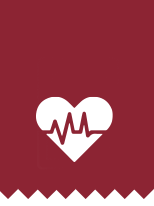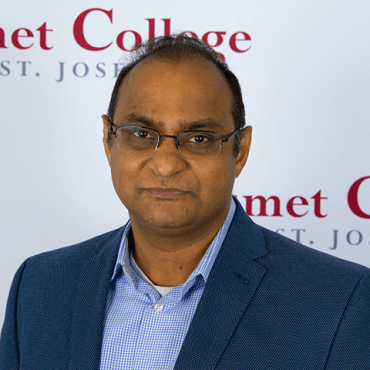
Public Health
Calumet College of St. Joseph's Public Health Program supports your dream of making a difference through healthcare
Ebola. Avian Flu. Tuberculosis. CoronaVirus (COVID-19). HIV/AIDS. Malaria. When people think of public health, these are the names that come to mind, and indeed, with our increasingly interconnected world, the spread of epidemic diseases is a major public health issue.
However, Public Health is much more than mere crisis response. Public Health is the science and art of preventing disease, prolonging life, and promoting human health through organized efforts and informed choices. It covers a wide range of sociological, scientific and mathematical approaches and seeks to improve standards of living, affect healthcare policy, and prevent the looming crises that stem from issues such as Antibiotic Resistance.
The Public Health Major is intended to prepare students for a wide range of career options, including Healthcare Administrator, Health and Safety Engineer, Environmental Specialist and Health Educator. It also provides students with a pathway toward graduate programs in Public Health and Epidemiology. Finally, when supplemented by Medical School requirements, it provides an excellent course of study for Pre-Medical students who wish to understand the broader context of a physician’s work or those who wish to work in healthcare policy.
In the Public Health program, you will:
- Assess the historical context of public health policies and use historical data to inform their positions
- Source, analyze and explain epidemiological data to inform policy design
- Assess the strengths and weaknesses of any given healthcare system
- Evaluate the failures and successes of modern public health policies in the context of health trends, including epidemics and the COVID-19 pandemic, and their relevance for future policy decisions
- Implement modern qualitative and quantitative research methods and evaluate the importance of those methods for a given problem
Request Information
Program Highlights
Developed with the World Health Organization
We collaborated with world leaders to help develop this curriculum, including Dr. Ajay Rangaraj, Dr. Skip Barbour and other WHO experts who cannot be listed due to their organizational roles.
Average Salary of $99,000+
Healthcare Administrators earn a median salary of $99,730 and expect a 32% job growth this decade.
Hybrid Learning Options
Some courses in this program are taken online & powered by Rize. The core curriculum will be taken on-campus, giving students the best of student life with the flexibility of some online learning.
Program Overview
Career Options
& Average Salaries
Career Options with this major include but are not limited to:
- Healthcare Administrator ($99,730)
- Health and Safety Engineer ($89,130)
- Environmental Specialist ($71,130)
- Health Educator ($46,080)

Delivered in Partnership with Rize Education
We conducted interviews with academics at Yale University, the University of Washington, UNC Chapel Hill, and LSHTM (London School of Hygiene and Tropical Medicine), as well as public health specialists from the World Health Organization to determine the key learning objectives of a successful undergraduate program in public health.
In addition to a strong liberal arts background, epidemiology, and certain topics from sociology, anthropology, and political science, we identified the following priorities:
- An understanding of health systems and the ramifications of politics on said systems.
- A strong background in quantitative studies, including Statistics, Probability, and Data Analytics.
- A foundation in the social sciences, including economics, anthropology, and sociology.
- An understanding of qualitative and mixed research methods.
- A deeper exploration of the role economics plays within public health.
The Public Health major addresses these concerns by functioning primarily as a social sciences degree. In addition to providing students with an understanding of research methods and data analysis, it also provides students with an understanding of the history and present reality of public health systems.
Students will learn about the role of both the citizen and the state in public health, understand the importance and implications of economics in healthcare, and master the key approaches and heuristics of public health.
MEET THE EXPERTS AND ADVISORS
Dr. Ajay Rangaraj, Subject Matter Expert
Dr. Ajay Rangaraj is a practicing physician and a consultant to the department of HIV, Hepatitis and STIs at the World Health Organization, Geneva. He played a pivotal role in developing the current WHO guidelines for treating HIV and communicating that information to world governments. Dr. Rangaraj is also a graduate of the London School of Hygiene and Tropical Medicine with an MSc in Public Health. He is the primary creator of the Public Health Major.
Curriculum Committee
Ajay Rangaraj | World Health Organization | Industry representative
Dr. Sarah McCool | Georgia State University | Academic representative
Augustina (Tina) Mensa-Kwao, MPH | University of Washington | Industry representative
Carolyn Hart | Coker | Academic representative
Craig Fuller | Centenary University | Academic representative
Sarabeth Spitzer | Brigham and Womens Hospital | Industry representative
Frequently Asked Questions
A degree isn’t a necessity, but it will probably help you get hired. When you earn a Bachelor’s of Science in Public Health, you may have an advantage in both earning potential and salary. People with a bachelor’s degree also have a 50% lower rate of unemployment, and on average they make an additional $630,000 to $900,000 over their lifetime—even more in high-growth fields like public health!
Yes! We want to ensure our program teaches you the skills you need to get hired and work through real-world problems that matter. The best way to do that is to partner with the people and companies who are actually doing it. Our collaboration with the World Health Organization, Fortune 500 companies and subject matter experts means their expertise is reflected in everything you’ll study here.
That’s really up to you! Public Health is huge, and our graduates leverage their skills to secure many kinds of high-growth employment. If you enjoy helping facilitate a process that serves a large number of patients, you may want to work as a healthcare administrator. If you want to play a role in preventing the next pandemic, you may want a job in public health policy. Our program is also an excellent path for pre-meds! As a Public Health grad, the high-paying possibilities available to you are essentially endless.
This major may be right for you if you enjoy learning how to prevent sickness and disease in communities, if you have a passion for helping people live healthy and fulfilling lives, or if you are looking for a degree that opens a ton of doors to different high-growth careers. You may also enjoy working in public health if you want to have a job that never gets boring and if you want to gain a skill set that makes you more and more valuable as your career progresses.
This concentration is part of an exclusive partnership between Calumet College of St. Joseph and Rize Education, which means you’ll be learning with students from your campus, as well as students from a selective consortium of schools across the country. The goal is to help you build a national network of people in your industry before graduating.
Faculty
Ahmed Lakhani, Ph.D.
Daniel Stroik, Ph.D.
Elizabeth Guzman-Arredondo, M.S.W., L.S.W.
Tracy Stone, Ed.D.
Program
Objectives and requirements
Upon completion of this program, it is expected that students will:
- Articulate the value of public health policy for societal, institutional and individual prosperity
- Form and justify predictions on the future developments of public health and public health policies
- Describe and assess the current landscape of private, public and international institutions in public health policy and their relative roles and importance in enacting policies
- Describe how disease and health concerns manifest and develop at national and global levels, and describe the importance of the field of epidemiology
- Use data analysis techniques to inform public health policy decisions
- Assess the public risks associated with health services and health policy
- Construct public health policy recommendations using historical context and data
- Evaluate political considerations in the context for a given public health policy decision
- Communicate the purpose and importance of a given public health strategy effectively
120 credit hours
The following courses are required for a baccalaureate degree:
38 hours: General Education
BIOL 115 Cell and Evolution (Lecture, Lab, Supplemental)
MATH 104 Precalculus
or MATH 110 Finite Mathematics
PHIL 200 Great Philosophical Ideas
6 hours: Requisites for Major
MATH 171 Principles of Statistics
SOCL 210 General Sociology
36 hours: Program Requirements
CHEM 143 Nutrition (Lecture, Lab)
ECON 210 Principles of Economics I (Macroeconomics)
EXSS 230 Principles of Health and Wellness
HSV 200 Introduction to Drugs and Alcohol
HSV 235 Statistics and Research Methods for Human Services
HSV 250 Ethics for Human Service Professionals
HSV 358 Social Service and Public Policy
KINE 300 Exercise Physiology I
KINE 305 Exercise Physiology II
KINE 343 Applied Nutrition
SOCL 316 Social Problems
SOCL 317 Masters of Sociological Theory
18 hours: Public Health Core through RIZE (these courses by RIZE will be online)
PHM 300 History of Public Health
PHM 301 Epidemiology
PHM 302 Health Services
PHM 303 Public Health Studies I: Current Topics and Policies
PHM 304 Public Health Studies II: Demographics, Geo-spatial Mapping and Qualitative Research
PHM 305 Health Economics
22 hours: Electives
Suggested electives:
PHM 495 Internship in Public Health
You Belong
at Calumet College of St. Joseph!






